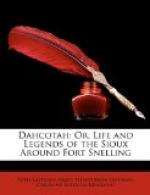After leaving their village, they entered the woods farther from the banks of the river. The guide who had seen the nest led the way, and the miniature warriors trod as lightly as if there was danger of rousing a sleeping foe. At last the old man pointed to the nest, and without a moment’s hesitation, the young Dahcotahs attacked it. Out flew the hornets in every direction. Some of the little boys cried out with the pain from the stings of the hornets on their unprotected limbs—but the cries of Shame! shame! from one of the old men soon recalled them to their duty, and they marched up again not a whit discomfited. Good Road cheered them on. “Fight well, my warriors,” said he; “you will carry many scalps home, you are brave men.”
It was not long before the nest was quite destroyed, and then the old men said they must take a list of the killed and wounded. The boys forced a loud laugh when they replied that there were no scalps taken by the enemy, but they could not deny that the list of the wounded was quite a long one. Some of them limped, in spite of their efforts to walk upright, and one little fellow had to be assisted along by his father, for both eyes were closed; and, although stung in every direction and evidently suffering agony, the brave boy would not utter a complaint.
When they approached the village, the young warriors formed into Indian file, and entered as triumphantly as their fathers would have done, had they borne twenty Chippeway scalps with them.
The mothers first applauded the bravery of their sons; and then applied herbs to their swollen limbs, and the mimic war furnished a subject of amusement for the villages for the remainder of the day.
CHAPTER IV.
It would be well for the Dahcotahs if they only sought the lives of their enemies. But they are wasting in numbers far more by their internal dissensions than from other causes. Murder is so common among them, that it is even less than a nine days’ wonder; all that is thought necessary is to bury the dead, and then some relative must avenge his quarrel.
Red Earth told her lover of the threat of Shining Iron, and the young man was thus put on his guard. The sons of Good Road’s first wife were also told of the state of things, and they told Fiery Wind that they would take up his quarrel, glad of an opportunity to avenge their own and their mother’s wrongs. It was in the month of April, or as the Dahcotahs say in “the moon that geese lay,” that Red Earth took her place by the side of her husband, thus asserting her right to be mistress of his wigwam. While she occupied herself with her many duties, she never for a moment forgot the threat of Shining Iron. But her cares and anxieties for her husband’s safety were soon over. She had not long been a wife before her enemy lay a corpse; his life was a forfeit to his love for her, and Red Earth had a woman’s heart. Although she could but rejoice that the fears which had tormented her were now unnecessary, yet when she remembered how devotedly the dead warrior had loved her, how anxiously he had tried to please her, she could not but shed a few tears of sorrow for his death. But they were soon wiped away—not for the world would she have had her husband see them.




